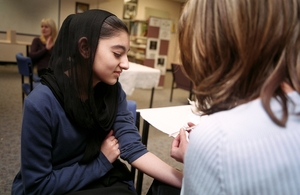National MMR vaccination catch-up programme announced in response to increase in measles cases
A national catch-up programme to increase MMR vaccination uptake in children and teenagers is announced today by Public Health England, NHS England and the Department of Health.

National MMR vaccination catch-up programme announced
The aim of the programme is to prevent measles outbreaks by vaccinating as many unvaccinated and partially vaccinated 10 to 16 year-olds as possible in time for the next school year.
New figures published today by Public Health England (PHE) show high numbers of confirmed measles cases in England in the first 3 months of 2013, reaching 587 by end of March, following a record annual high of almost 2,000 cases in 2012. This is despite the highest ever national MMR vaccination level being achieved in England, with 94% of 5 year olds receiving 1 dose and 90% receiving 2 doses, according to latest PHE data.
Experts believe the rise in measles cases can be mostly attributed to the proportion of unprotected 10-16 year-olds who missed out on vaccination in the late 1990s and early 2000s when concern around the discredited link between autism and the vaccine was widespread. At this time measles had been eliminated in the UK, but coverage fell nationally to less than 80% in 2005, with even lower uptake in some parts of the country. After many years of low vaccination uptake, measles became re-established in 2007.
Cases are distributed across England with the highest numbers of cases in the North West and North East. Almost 20% of cases (108) were hospitalised and 15 people experienced complications such as pneumonia, chest infection, meningitis and gastroenteritis.
The catch-up programme announced today sets out a national framework within which local teams – led by NHS England Area Teams, working alongside Directors of Public Health in Local Government, and supported by PHE centres – will produce tailored plans to identify and give MMR to unvaccinated and partially vaccinated 10-16 year-olds through GPs and/or school programmes. Local intelligence may reveal the need to expand the focus of the catch-up activity beyond the 10 to 16 year-old age groups and where this is recognised, further local action will be taken.
Our best estimate indicates that there are approximately one third of a million 10 to 16 year-olds (around 8%) who are unvaccinated and another third of a million who need at least 1 further dose of MMR to give them full protection. It is also estimated that there are around another one third of a million children below and above this age band who need at least 1 further dose of MMR. The target population for this catch-up programme is therefore of the order of one million doses.
Dr Mary Ramsay, Head of Immunisation at PHE, said:
Measles is a potentially fatal but entirely preventable disease so we are very disappointed that measles cases have recently increased in England. The catch-up programme set out today recommends an approach to specifically target those young people most at risk. Those who have not been vaccinated should urgently seek at least 1 dose of MMR vaccination which will give them 95% protection against measles. A second dose is then needed to provide almost complete protection.
“The only way to prevent measles outbreaks, such as the one we are seeing in South Wales, is to ensure good uptake of the MMR vaccine across all age groups. Measles is not a mild illness – it is very unpleasant and can lead to serious complications as we have seen with more than 100 children in England being hospitalised so far this year.
Dr Paul Cosford, Director for Health Protection at PHE, said:
We believe this national framework for a catch-up programme sets out an appropriate response to the situation in England, using the range of expertise and skills across the new public health system. Although nationally the numbers needing catch-up vaccination is quite large, there are relatively few in each local area. We are confident that local teams have the resources to identify and vaccinate those children most at risk, and that the NHS has sufficient vaccine to cover the approaches described in the action plan.
Our plan specifically aims to strengthen current routine approaches to vaccination and specifically to target “hard to reach” populations with known low vaccination rates. We will aim to generate demand for vaccination among the parents of 10 to 16 year-olds through clear messages, for example through written materials and the launch of a new Facebook page in conjunction with NHS Choices, and shall be using #getthemmr with partners on Twitter.
Professor David Salisbury, Director of Immunisation at the Department of Health, said:
It is essential that we get ahead of measles and the only way to do this is to protect people before measles catches them. The safety record of MMR is not in doubt and the best thing that parents can do, if their children have not had 2 doses of MMR, is to make an appointment with the GP now.
Notes to editors
-
More information on the MMR catch-up programme will be available on the PHE website from Thursday 25 April. A table with laboratory confirmed cases of measles by region and age group in England is available from the press office.
-
For more information on measles and MMR, please visit PHE’s Measles page or the NHS Choices Measles page
-
Public Health England is a new executive agency of the Department of Health that took up its full responsibilities on 1 April 2013. PHE works with national and local government, industry and the NHS to protect and improve the nation’s health and support healthier choices and will be addressing inequalities by focusing on removing barriers to good health. To find out more visit our website www.gov.uk/phe, follow us on Twitter @PHE_uk
UK Health Security Agency press office
10 South Colonnade
London
E14 4PU